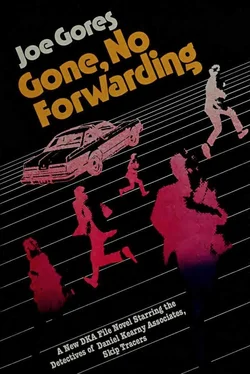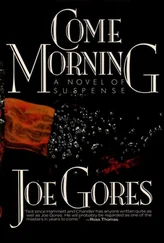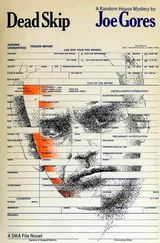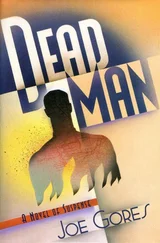“Anything you can do?”
Head nurses could do a great deal. “But just for a moment, you understand? She’s conscious but despite the sedation in a good deal of pain, and...”
Fleur’s voice came on, weak and pinched.
“Fleur, this is Bart Heslip. I just heard—”
“You bastard! Oh, you rotten son of a bitch bastard!”
“Fleur, I swear to you I didn’t know anything heavy like this was going down—”
“You knew they was followin’ us. They said they’d hurt me an’ I told ’em. Gave that address for Verna. I’m glad I told ’em cause maybe you’ll get in their way an’ they’ll do you like they done me.”
“Fleur, anything you need—”
“How about a new nose? A new ear?” Her voice was a ragged scream. “After I told ’em they done it. For fun. I hope they get you an’ cut your nuts off!”
He hung up the dead phone and stood shivering in the sunshine.
Dan Kearny dialed and when a hard male voice answered, asked for Benny Nicoletti. Nicoletti was out. Kearny left his name and number. Seven minutes later the unlisted phone rang — the line wasn’t run through the switchboard.
“I got your message.”
“Pivarski is going to be there on Monday,” said Kearny. “The Hearing Officer made it official.”
“Monday!” exclaimed Nicoletti. “I thought this afternoon was when they were supposed to—”
“Delaney conned him into waiting until Monday. Said Hawkley couldn’t have his client there until after the weekend.”
“Those bastards gotta have a pipeline!” exclaimed Nicoletti angrily. “After the weekend! Hell, that’s exactly...” He paused. “Look, Dan, not on the phone. Can you come over to the Hall?”
“No way. After Monday I might not have a license, I’m getting out all the billing I can today, so—”
“Okay. I’ll be there in ten minutes.”
Kearny hung up and looked at his watch and blew out a deep breath. Right on schedule. The bastards had better be listening. When Nicoletti’s bulky form filled the open doorway a few minutes later, Kearny actually was immersed in the billing. He looked up. “I don’t know why I ever agreed to cooperate with you guys,” he said crossly to the big cop. “Shut the door.”
Nicoletti did.
Kearny said, “Okay, what couldn’t you tell me on the phone?”
Nicoletti leaned forward confidentially. By so doing, he brought his head closer to the bugged phone. “Dan, there’s gotta be a leak in the Department. What tipped me was your saying they insisted Pivarski couldn’t show at the hearing until after the weekend. See, we got him down here early in the week, told him it’d be a day, two days, for us to set up an eyeball of Pivarski for him. Now all of a sudden it’s going on a week. So just yesterday he told us that was it, back to Canada Friday night — tonight — if he isn’t shown Pivarski in the flesh today.”
He leaned back and sighed gustily. “I’ll do my damndest between now and tonight to talk him into staying until Monday, but I think we’re dead. Jesus, what a mess.” He stood up and shook hands with Kearny, winked and grinned and said, in a very worried voice, “I’ll let you know if we can get him to change his mind.”
When he was gone Kearny lit a cigarette. So, if the tapes were turning, this would take the pressure off Nicoletti’s witness. And on Monday morning when Hawkley finally brought Pivarski in thinking there was no chance of him being eyeballed by the linen-truck driver, he would get a surprise.
Ballard was singularly unsurprised to learn the resident manager of Madeline Westfield’s apartment house could tell him little of the tenant in Apartment 23. That was par for the course. But the manager, Mrs. Garnison, wasn’t. She was the rarest of landladies, one who didn’t give a damn. She was an imperious, iron-haired fifty-five, with iron in the spine and an open mind.
“Madeline? In a place like this, one of my oldest tenants. She’s been here nearly two years, I’d have to look it up if you need an exact date.”
“Two years is fine.” Ballard had said he was from a bank to which Ms. Madeline Westfield had applied for credit.
“Banks want to know a lot more than they have to.” She was knitting, her large, shapely, capable hands moving with bewildering speed, clicking the needles in a syncopated counterpoint to her words. She never looked down; some inner computer seemed to know when those hands had taken the needles to the end of a row.
“Well, she wants to finance a very expensive car through the bank, and they want to be sure she can handle the payments. Can you confirm where she works?”
“Last I knew...” She was squinting. She started to shake her head, then her face cleared. “Sure. When she took the apartment, she was working for United Parcel Service.”
Ballard nodded sagely. “That agrees with our records. Now, how can I put this, Mrs. Garnison? Personal data. Do you know of any personal habits that aren’t... well, that might interfere...” He let his tut-tut expression speak for him. “Any special boyfriends or...”
She shook her head vigorously. “Mister, she could run a football team through that apartment for all I know or care, long as their cleats don’t scar the floors.”
That was that from Mrs. Garnison. He used the same pay phone that he had used that morning with Kearny to call the retail credit agency he’d asked to get a complete rundown on Greenly’s credit.
“Oh, hi, Mr. Ballard, I’m glad you called. We just got that data you requested. As we told you yesterday, his current rating is top of the heap. But the computer tells us that as recently as five months ago his credit was very spotty. Bad pay on credit cards and retail accounts, paid the late penalty on his house note for seven months out of an eleven-month period. Classic picture of a man getting into financial trouble. Then he got healthy and has stayed that way ever since.”
Ballard felt a rising excitement. Greenly was beginning to come together in a picture very different from the one he presented to the casual observer.
“Anything in the derogs to suggest what his problem was?” Derogs were raw data, derogatory reports collected in the field from friends, associates or neighbors by the retail credit checking firm. They did not go into client reports.
“Um...” Ballard could hear papers being shuffled. “A number of informants said he liked poker and the ponies. Gambling.”
“Women?”
“Steady family man, by all reports.”
More and more, Madeline Westfield was beginning to look like a charade played for Madeline’s benefit. Greenly, in financial trouble through gambling, is subverted by mob money for some purpose. What? No idea. But something involving DKA in some way. To get what the mob needs, he has to seduce Madeline Westfield. He goes through the motions, gets what he needs.
So the something has to do with Madeline’s job. What in hell could an employee of United Parcel Service have that someone out after DKA could need? Answer: Madeline was no longer employed at UPS. So one of Ballard’s jobs was to get her current employment. And in Sacramento he was pretty sure it was in state government. And not in Professional and Vocational Standards, because then Greenly could have gotten what he needed on his own.
Ballard caught Interstate 80 back downtown, and got off at Fifteenth Street. Greenly banked at the Bank of Tokyo on Broadway and Fourteenth. Time to try to fake his way into a look at Greenly’s account. See if five or six months ago heavy cash deposits had suddenly begun. See if cash payments to Madeline Westfield had begun. He was sitting outside in the Cutlass trying to work up the nerve to pass himself off as a state investigator when he had an inspiration. One of those inspirations recognized — if not always understood — not only by detectives private and public, but by scholars, researchers, and genealogists among others. The sudden rush of feeling that made you tum around and go back to ask the final question and break the case. The phone call you hadn’t planned to make, the public record book you reached for when the one you really wanted was out, the name you looked under in a phone book that had no rational connection with your subject but was the name he was hiding under, all the same.
Читать дальше



![Эрик Рассел - Подарок дядюшки Джо [=Подарок от Джо] (ёфицировано)](/books/65161/erik-rassel-podarok-dyadyushki-dzho-podarok-ot-dzho-thumb.webp)








